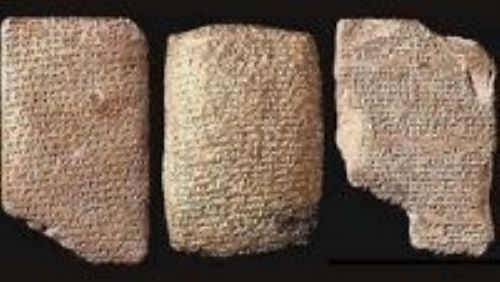"The Tell el-Armana (mound of Armana) lay halfway between Memphis and Thebes, and was the remains of Pharaoh Akhenaton's model capital city which was spoiled and left to ruin around 1358-50 B.C. In 1887, a peasant woman dug for fertile soil in the mound and uncovered the royal archives of Amenhotep III, and his royal son Amenhotep IV, who early in his career changed his religion and became known as Akhenaton. (He had a famous long-necked wife named Nefertiti.) Eventually, more than 350 cuneiform tablets were recovered, most of which were frank personal letters and dispatches from kings, governors, and officers located in cities and fortresses of Babylonia, Mitanni, Phoenicia, Syria, and Palestine. They were written between 1400 and 1358 BC and sent to these two pharaohs at the Egyptian court. They are from 2-3 inches wide, and 3-9 inches long, inscribed on both sides."
"The Tell el-Armana tablets have proved exceedingly important in the field of biblical research. Many regard them as constituting the most important discovery ever made in Egypt. The very fact that most of these tablets were written in Babylonian cuneiform, even though they came from various countries, indicates that the Babylonian cuneiform was the one general system of writing readily understood by almost all the people of Bible lands during that particular period. Thus, biblical characters could converse rather freely with the various peoples as they moved from country to country, just as depicted in the OT. For instance, when Abraham came to Syria, Canaan, and Egypt, he could speak to Pharaoh, Sodom's king, Eliezer and Hagar (Gen. 12:18, 14:22, 15:2, 16:3)."
"As to the contents, the clay tablets described Palestine and the surrounding countries as being in a state of turmoil within, and as being attacked from without. For example, the governor or officer in charge at Gezer wrote to the pharaoh saying, in part: Let my lord the king, the sun in heaven, take heed unto his land, for the Khabiri are mighty against us; and let the king, my lord, stretch out his hand unto me and let him deliver me from their hands, so that they may not make an end of us."
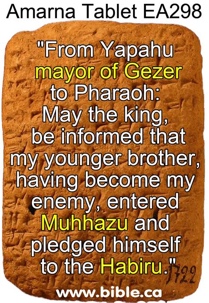
"A number of letters from Abdi-Heba, governor of Urusalem (Jerusalem), pled for help from Pharaoh Akhenaton to prevent the country from being lost to Egyptian rule. In part, one of the letters read: To the king my lord, say. Thus saith Abdi-Heba thy servant. At the feet of the King, my lord, seven time and seven times I prostrate myself ... The whole land of the King has revolted. There is not one governor that is loyal to the King, all have rebelled. May the King harken unto Abdi-Heba and send troops, for if no troops come this year, the whole territory of my lord the King will be lost. The Habiru are capturing the fortresses of the King. May the King care for his land. The Habiru are taking the cities of the King ... If there are no archers this year, then let the King send a deputy that he may take me to himself together with my brothers and we die with the King, our lord."
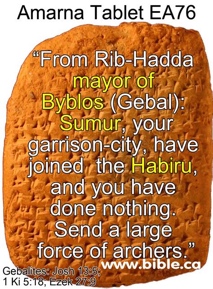
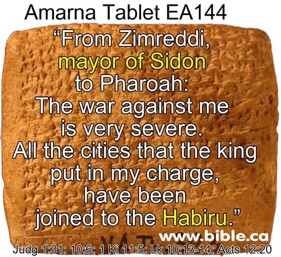
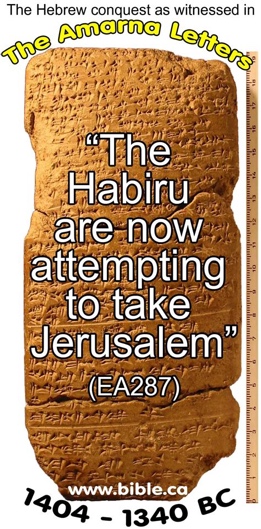
"These tablets frequently use the name Habiru in speaking of those who were overrunning the country. Many of the very finest scholars regard the Habiru (or, Khabiri) as the Hebrews, and the whole framework fits in well with the early date (1400 B.C.) for the beginning of the Hebrew conquest of Canaan under Joshua. The picture of the invaders fits the Hebrews so well that is has been said, 'Here we have a story of Joshua's conquest of Canaan from the enemy's side.'"
Indeed, we do! Visit Bible.ca [2] for a thorough comparison between the tablets and Joshua's history of the Canaanite conquest.
[1] Description adapted from The Thompson Chain Reference Bible, 5th edition, B. B. Kirkbride Bible Co., Inc, 1988, Archaeological Supplement #4328 (p.1721, 1724).
[2] Annotated images and conquest history at https://www.bible.ca/archeology/bible-archeology-maps-conquest-amarna-tablets-letters-akhenaten-habiru-abiru-hebrews-1404-1340bc.htm
Like this? Consider sharing it to Facebook by clicking the linked icon below.

